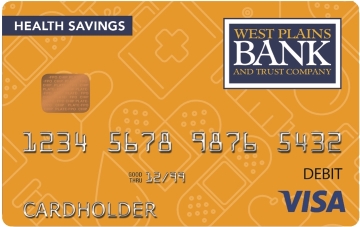
Whether you need the funds now or save them for later, a health savings account (HSA) is a great way to cover your medical expenses tax-free (as part of a high deductible health plan). Plus, your employer may contribute money to your HSA as well (ask employer for details).
- Triple tax advantages (contributions, earnings and qualified withdrawals are not taxed)
- Yours to keep forever (*even if your health plan changes)
- No “use it or lose it” rule
* The HSA account and the funds in it remain the property of the account owner even if coverage under a high deductible health insurance plan has ended. However, no additional contributions may be made to the account unless enrolled in another qualifying high deductible health plan.
Set up a savings account to take care of healthcare needs now and down the road. With an HSA, you get an easy, flexible way to set aside and grow money tax-free so it’s there when you need it.
Contact your tax professional to determine if your health plan qualifies you for an HSA account and to determine your HSA contribution limits.
How an HSA works:
- Contribute money pre-tax from your paycheck
- Choose the amount you want to contribute
- Change your contribution at any time
- Earn interest and grow your HSA tax-free
- Roll over funds every year
- Take it with you if you change jobs or health plans
- Withdraw money tax-free for medical expenses like these:
- Doctor’s visits
- Dental care
- Physical therapy
- Prescriptions
- Vision care
- More
Answers to questions about an HSA:
Q: What is an HSA?
A: An HSA is a tax-advantaged savings account that lets you set aside money to cover your healthcare costs – and it’s only available with an HSA-qualified health plan. Your money goes in tax-free, grows tax-free and can be used now for eligible healthcare expenses…completely tax-free. Plus, once you open an HSA, it’s yours to keep. So, whether you spend the funds now or save them for retirement, an HSA is a smart way to make your money go further.
Q: Is there a minimum amount I have to contribute?
A: No. You can choose to contribute any amount that works for you – up to the legal limit. Plus, you can change the amount of your contribution at any time.
Q: What is a “qualified withdrawal”?
A: An HSA is designed to cover a multitude of medical expenses. So, when you use it for co-pays, prescriptions – even over-the-counter items like bandages – you’re making a qualified withdrawal. Your employer can provide you with a complete list of eligible medical expenses. (Medical insurance premiums are not considered a qualifying expense under HSA guidelines.)
Q: What if I have money left in my HSA at the end of the year?
A: No problem! There’s no “use it or lose it” rule. So, the money in your account will roll over every year. And, if you change jobs or health plans, you can take your HSA with you.
Q: Why do I need an HSA if I’ll have Medicare when I retire?
A: Medicare may only cover 59% of your healthcare expenses in retirement.* So, an HSA is a smart way to make up the difference and ensure you have a safety net in place.
*Source: EBRI (Employee Benefit Research Institute)
For additional information regarding HSA accounts, visit IRS guidelines for Health Savings and Other Tax-Favored Health Plans
